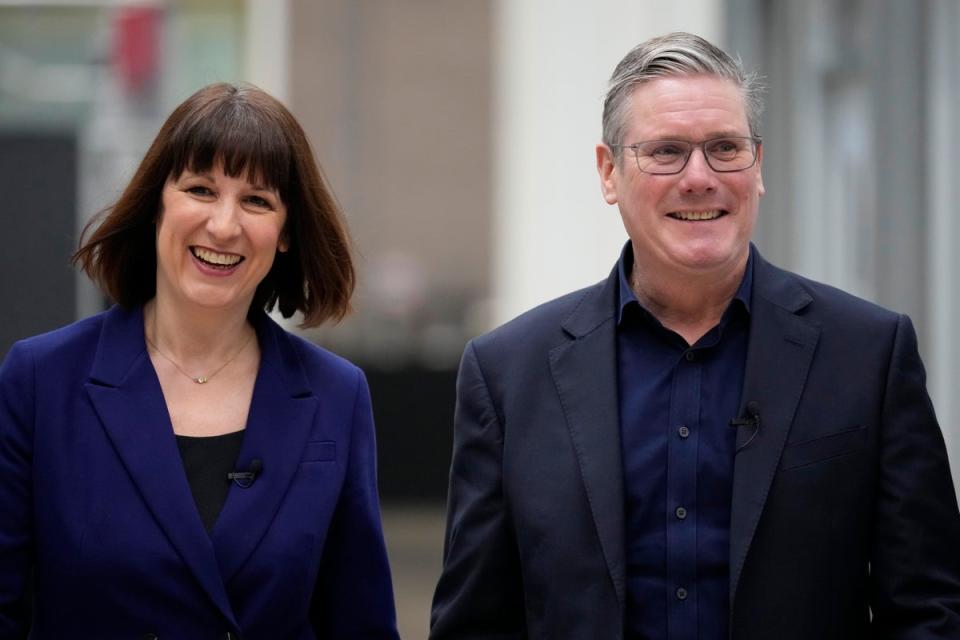Rachel Reeves grilled over Labour’s £28bn u-turn: ‘Don’t you want to think big any more?’
Rachel Reeves has come under fire over Labour’s £28bn green spending u-turn, with a BBC presenter asking: “Don’t you want to think big any more?”
The shadow chancellor was taken to task after she and Sir Keir Starmer finally confirmed the spending pledge had been “stood down”.
Instead, Ms Reeves and the Labour leader unveiled a much less ambitious set of measures, which will cost £23.7bn over the party’s first five years in power if it wins the next election.
After weeks of flip-flopping, with Sir Keir backing the original £28bn a year figure as recently as Tuesday, the party blamed the Conservatives for “crashing the economy” as it downsized its plans.

BBC Radio 4 Today programme presenter Mishal Husain grilled Ms Reeves on Friday morning, asking her: “Don’t you want to think big any more?
“Imagine if Labour in 1945 had thought about health and rolled back from founding the NHS in the way that you have diluted your single biggest policy pledge.”
But Ms Reeves insisted that, despite scaling back the funding, Labour’s so-called green prosperity plan will be “transformational for our economy, for jobs and for bills”.
And she insisted that Labour is “determined” to deliver the plan.
Ms Reeves said: “People can see that since the Conservatives crashed the economy, things have changed. That means we’ve had to update our plans.
“What we’ve got now is an ambitious plan for decarbonizing the economy which are all affordable within our fiscal rules.”
But her clash with Ms Husain came just moments after she was grilled by BBC Breakfast presenter Charlie Stayt over the policy.
“Why should anyone believe the things you say about your plans, when you are prepared, if the circumstances require it, to just do other things?” he asked.
He added: “It is very hard to know what we can believe.”
The exchanges followed a Thursday press conference in which Labour drastically scaled back its flagship economic policy ahead of this year’s election.
The Conservatives had seized on the original £28bn a year figure as a key attack line, claiming Labour would ultimately have to raise taxes to meet the “unfunded spending spree”.
The party’s Warm Homes Plan, a £6bn package of measures to improve energy efficiency, is set to be one of the casualties of the climbdown with Labour confirming that it will now take longer than originally estimated, with five million homes now set to be upgraded during the first five years.
But it comes alongside plans to extend the windfall tax on oil and gas companies to the end of the next parliament, with the energy profits levy rising to 78%.
The Labour leader insisted the party in power would still retain its mission to achieve clean power by 2030, stressing that it could still be achieved.
Ms Reeves denied she had bullied her party leader into the climbdown and reiterated her vow to become the UK’s first “green” chancellor.
She again denied a behind-the-scenes rift with Sir Keir on Friday, saying they “work together every single day” and she has “a strong relationship with Keir”.
The scaling back of the pledge has drawn condemnation from unions, environmental groups, Labour grandees and MPs.
Former Labour minister Lord Blunkett said “the PR, the timing” of the U-turn “couldn’t have been worse” and he hoped “lessons have been learned”.
And ex-shadow minister Barry Gardiner warned Labour now risked “being so bland that you stand for nothing”.

Science minister Andrew Griffith said Labour has "got a lot of explaining to do" for u-turning on the £28bn a year green investment pledge, but added that the plan would have been "foolish".
He told Times Radio: “Rachel Reeves ran off to the US, was impressed by the idea of spending lots of public money, taxpayers’ money, on plans that they hadn’t costed, hadn’t put together properly.
“And the fact that those plans are now unravelling, just shows how foolish it would be and how expensive for taxpayers, were they to get into power.”
Rishi Sunak attacked the party as well, with the prime minister saying Labour’s flagship economic policy was now “in tatters”.


